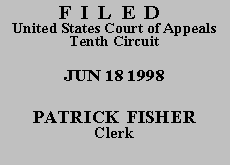

| UNITED STATES OF AMERICA
Plaintiff-Appellee, v. BILLY F. MARCH, |
|
Billy March seeks a certificate of appealability to appeal the denial of his motion to modify his sentence as untimely filed. Because March has failed to make "a substantial showing of the denial of a constitutional right," 28 U.S.C. § 2253(c)(2), we deny his request for a certificate of appealability and dismiss the appeal.
March was convicted by a jury in 1992 of four counts of bank robbery, in violation of 18 U.S.C. § 2113(a), and was sentenced to 210 months' imprisonment. His conviction and sentence were affirmed in his direct appeal. United States v. March, 999 F.2d 456 (10th Cir. 1993). March filed a motion to modify his sentence pursuant to 18 U.S.C. § 3582 on August 29, 1997, arguing his criminal history was incorrectly calculated and that Amendment 382 to U.S.S.G. § 4A1.1 should have been applied. His primary complaint is that his five prior aggravated robbery convictions should have been treated as one under the "related sentence" subsection of § 4A1.1(f). The district court found § 3582 did not provide the court with any authority to grant relief, construed the motion as one brought under 28 U.S.C. § 2255 to correct an illegal sentence, and denied the motion as untimely filed.
On appeal, March contends he was denied procedural and substantial due process at sentencing, and that the district court should have considered his motion under 18 U.S.C. § 3582(c)(2) and § 3553(a).
The court may not modify a term of imprisonment once it has been imposed except that--
. . .
(2) in the case of a defendant who has been sentenced to a term of imprisonment based on a sentencing range that has subsequently been lowered by the Sentencing Commission pursuant to 28 U.S.C. 994(o), upon motion of the defendant or the Director of the Bureau of Prisons, or on its own motion, the court may reduce the term of imprisonment, after considering the factors set forth in section 3553(a) to the extent that they are applicable, if such a reduction is consistent with applicable policy statements issued by the Sentencing Commission.
18 U.S.C. § 3582(c)(2).
Amendment 382 to U.S.S.G. § 4A1.1 became effective November 1, 1991, and March was sentenced on September 8, 1992. There is nothing in the record before us to indicate the sentencing court did not consider Amendment 382, which was in effect ten months prior to sentencing.
We also decline March's request that we invoke jurisdiction pursuant to 28 U.S.C. § 1651(a). As we conclude there was no error committed in March's sentencing, there is no basis for concluding a miscarriage of justice occurred in this case.
The district court properly construed March's motion under 28 U.S.C. § 2255 and determined the motion was untimely filed. We DENY a certificate of appealability and DISMISS the appeal. The mandate shall issue forthwith.
Entered for the Court
Mary Beck Briscoe
Circuit Judge
*. This order and judgment is not binding precedent, except under the doctrines of law of the case, res judicata, and collateral estoppel. The court generally disfavors the citation of orders and judgments; nevertheless, an order and judgment may be cited under the terms and conditions of 10th Cir. R. 36.3.